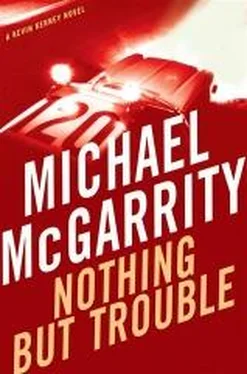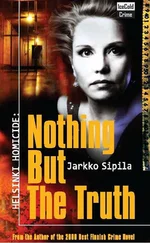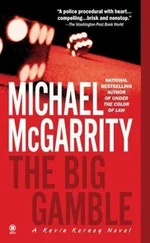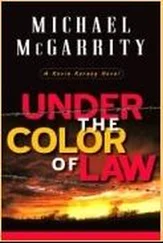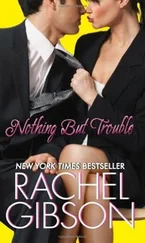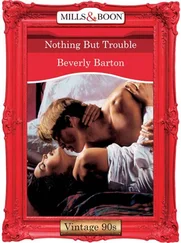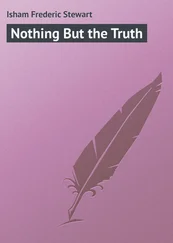Michael McGarrity - Nothing But Trouble
Здесь есть возможность читать онлайн «Michael McGarrity - Nothing But Trouble» весь текст электронной книги совершенно бесплатно (целиком полную версию без сокращений). В некоторых случаях можно слушать аудио, скачать через торрент в формате fb2 и присутствует краткое содержание. Жанр: Триллер, на английском языке. Описание произведения, (предисловие) а так же отзывы посетителей доступны на портале библиотеки ЛибКат.
- Название:Nothing But Trouble
- Автор:
- Жанр:
- Год:неизвестен
- ISBN:нет данных
- Рейтинг книги:4 / 5. Голосов: 1
-
Избранное:Добавить в избранное
- Отзывы:
-
Ваша оценка:
- 80
- 1
- 2
- 3
- 4
- 5
Nothing But Trouble: краткое содержание, описание и аннотация
Предлагаем к чтению аннотацию, описание, краткое содержание или предисловие (зависит от того, что написал сам автор книги «Nothing But Trouble»). Если вы не нашли необходимую информацию о книге — напишите в комментариях, мы постараемся отыскать её.
Nothing But Trouble — читать онлайн бесплатно полную книгу (весь текст) целиком
Ниже представлен текст книги, разбитый по страницам. Система сохранения места последней прочитанной страницы, позволяет с удобством читать онлайн бесплатно книгу «Nothing But Trouble», без необходимости каждый раз заново искать на чём Вы остановились. Поставьте закладку, и сможете в любой момент перейти на страницу, на которой закончили чтение.
Интервал:
Закладка:
At Sara’s back pitched-roof buildings crowded Bray’s waterfront high street. The shoreline curved toward the spit of land where a new residential development stood and the houses, all with matching red tile roofs in an Italianate style, climbed up the hillside to take in views of the bay.
Phelan had said it was a fine evening with a smooth sea, and indeed it was so. Sara wondered where Spalding might be out on the water. Was he anchored in some nearby cove or at an offshore island? Or cruising slowly southward in St. George Channel? She was less than a day behind Spalding now, but catching him remained no easy matter. They could probably reach him by ship to shore radio, but doing so could easily raise his suspicions.
Fitzmaurice motioned to her, and she walked back along the pier to the car where he waited. He told her the solicitor would be interviewed first thing in the morning and the order to inspect Paquette’s Internet account and e-mail records had been served.
“Do we have her picked up?” he asked.
“I’d rather wait until we know Spalding’s exact location,” Sara replied.
“I’ve put in a query to his credit-card company,” Fitzgerald said. “We’ll have him the next time he uses it.”
On their return to Dublin, Fitzmaurice avoided the motorway and drove through the coastal towns of Shankill, Killiney, and Dalkey until they reached Dun Laoghaire. Sara fell silent, gazing out the car window at the glimpses of the sea and the plots of pastureland that dotted the inland side of the coastal hills. Along a winding, narrow road bordered by hedgerows they passed by granite cliffs covered in yellow shrubs, huge estates on promontories overlooking the water, and a seaside park along an inlet with rock outcroppings and tall trees that were dark green against the backdrop of gray sky and water.
In the towns they passed by weathered cut-stone churches with towering spires, an old castle with high turrets and parapets, and rows of Victorian and Georgian houses behind stone walls on finely tended lawns.
Although Fitzmaurice had said nothing about taking her on an impromptu Cook’s tour, Sara appreciated his thoughtfulness and said so as they drove through Rathfarnham, a suburb of the city nestled against the foot of the Dublin Mountains several miles south of St. Stephen’s Green.
So this is his semidetached, she thought, as Fitzmaurice pulled to a stop in front of a two-story modern town house in an established subdivision. It had brick facing on the ground floor, a plastered exterior wall above with several windows that looked out on the street, and a pitched, shingled roof with shallow eaves. A common lawn in front of the building had separate walkways leading to the two ground-floor entrances.
Fitzmaurice pointed to his side of the semidetached before killing the engine. “Here we are, then,” he said. “Clan Fitzmaurice’s castle, wherein the lady of the house awaits along with my infant son, should he be home from university.”
Sara climbed out of the car. “It’s sweet,” she said.
Fitzmaurice shut the door and locked the car. “And within a very short distance of a real castle, where my grandfather worked as a groundskeeper when the Jesuits owned it. Sometime back they found secret tunnels at the castle, one of which runs to the golf course where I spend many pleasant afternoons slicing balls into the rough. We have megalithic tombs on the mountaintops and are home to the abbey where Mother Teresa of Calcutta first entered the religious life.”
“History is all around you,” Sara said as they walked toward the house.
“That it is,” Fitzmaurice said with a laugh. “We also are home to the first McDonald’s drive-through in Europe, for which, of course, we are eternally grateful.”
“Is that true?” Sara asked.
Fitzmaurice nodded and grinned. “We’re planning to raise a statue to Ronald McDonald on the town green to commemorate the historical event.”
Edna Fitzmaurice met them at the door. Green eyed, with laugh lines at the corners of a broad mouth, she was a tall full-figured woman dressed casually in jeans and a short-sleeve pullover top.
“So you are the woman who’s kept my husband from hearth and home,” she said, after greeting Sara warmly. “Come inside and tell me how he’s been misbehaving.”
In the living room Edna sat with Sara on a couch facing a fireplace, while Fitzmaurice opened a bottle of wine at the sideboard in the adjacent dining room. The small living room, comfortable and inviting, had scaled-down furnishings that created a feeling of spaciousness, and built-in shelves filled with books. From the kitchen came the aroma of roasting lamb with a hint of garlic. Footsteps on the stairway from the second floor announced the arrival of Sean Fitzmaurice, who rushed into the room and smiled at Sara with a toothy grin.
“Finally we get to meet,” he said, shaking her hand. “At the award ceremony I was warned to stay away. Garda business and all that. Are you really an American army officer?”
Sara smiled back at the boy. “I am.” No more than nineteen or twenty, Sean had his father’s wide shoulders, large hands, and blunt fingers, and his mother’s eyes and mouth.
“Leave her alone, Sean,” Fitzmaurice called out as he carried in the wineglasses. “The colonel is a married woman. Wife and mother, to be exact.”
After a glass of wine Sara helped Edna put the finishing touches on dinner, while Sean and Hugh set the table. Father, mother, and son were convivial company. Edna had bought the lamb-done to perfection-from a butcher who raised and slaughtered his own sheep on a farm in County Roscommon. A bowl of fruit topped off the meal, and it was then that Sean asked her if she’d read the works for which Brendan Coughlan had been honored at the National University.
“I have not,” Sara replied. “But he’s now on my personal short list of writers to read.”
Sean nodded with great seriousness. “He has a lyrical flair and a wonderful way of describing characters and settings. Did you ever hear of Finley Peter Dunne, a late-nineteenth-century Irish-American journalist?”
Sara’s eyes widened in surprise. For an American Studies class at West Point she’d written a research paper on Dunne, a Chicago columnist who had created a comic Irish saloonkeeper named Mr. Dooley, a character with strong anti-imperialist tendencies who tenaciously criticized the Spanish-American War.
“Did you know he was great friends with Teddy Roosevelt, in spite of his opposition to the Spanish-American War?” Sara asked.
Sean beamed with pleasure. “I did. What was Mr. Dooley’s given name?”
Sara laughed. “I don’t remember.”
“Martin,” Sean replied. “And the customer who most often had to endure Dooley’s social commentary was named Hennessy.”
“That’s right,” Sara said. “Did you know that before he moved to New York City, Dunne wrote articles on women’s issues for the Ladies’ Home Journal magazine?”
Sean nodded. “He was one of the most popular muckraking reformers of his day.”
“How did you come to discover him?” Sara asked.
“I’m reading Irish-American Literature at Trinity,” Sean replied. “Do you know Thomas Flanagan’s works?”
“I’m afraid not,” Sara said with a shake of her head.
“You’re missing one of America’s great writers. He wrote a trilogy set here that reads like the work of a native son. Would you like me to write the titles down for you?”
“Yes, please.”
“Enough about books,” Fitzmaurice said as he pushed his empty fruit bowl away, “otherwise we’ll be sitting at this table long into the wee hours of the night.”
After the table had been cleared, Sean retreated to his room to study, and Sara helped Edna scrape and stack the dishes in the galley kitchen. As they stood at the sink, Edna turned to her and said, “I do hope you don’t think I invited you over to see if my husband was planning to take you away on a dirty little weekend.”
Читать дальшеИнтервал:
Закладка:
Похожие книги на «Nothing But Trouble»
Представляем Вашему вниманию похожие книги на «Nothing But Trouble» списком для выбора. Мы отобрали схожую по названию и смыслу литературу в надежде предоставить читателям больше вариантов отыскать новые, интересные, ещё непрочитанные произведения.
Обсуждение, отзывы о книге «Nothing But Trouble» и просто собственные мнения читателей. Оставьте ваши комментарии, напишите, что Вы думаете о произведении, его смысле или главных героях. Укажите что конкретно понравилось, а что нет, и почему Вы так считаете.
